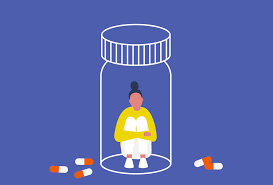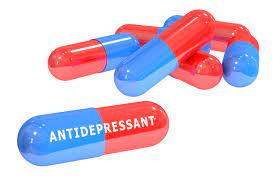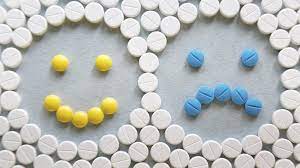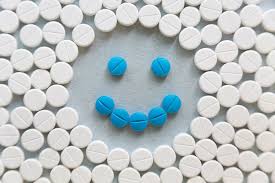Depression is a serious mental illness that can impact all aspects of an individual’s life. It is estimated that around 7 percent of Americans suffer from depression at some point in their lives. While many people choose to treat their depression with counseling and therapy, others may find that medication is also necessary. Antidepressants are one type of medication used to treat depression. In this blog post, we will discuss antidepressants: what they are, how they work, their side effects, and more!
Contents
Understanding Antidepressants

Antidepressants are a type of medication used to treat depression. They work by altering the levels of certain chemicals in the brain that can become unbalanced and lead to symptoms of depression.
What Are They Used For?
Antidepressants can be used to treat both major depression and minor cases of depression. They are also sometimes prescribed for anxiety disorders, obsessive-compulsive disorder (OCD), and posttraumatic stress disorder (PTSD).
How Do They work?
Antidepressants work by altering the levels of certain chemicals in the brain that can become unbalanced and lead to symptoms of depression. There are a variety of different types of antidepressants, each with its unique mechanism of action.
Types of Antidepressants
There are a variety of different types of antidepressants.
Selective serotonin reuptake inhibitors (SSRIs)
Selective serotonin reuptake inhibitors (SSRIs) are the most common type of antidepressant. SSRIs work by blocking the reabsorption of serotonin, which increases the amount of serotonin in the brain.
There are a variety of different SSRIs available, including:
- Citalopram (Celexa)
- Fluoxetine (Prozac)
- Paroxetine (Paxil)
- Sertraline (Zoloft)
Serotonin and norepinephrine reuptake inhibitors (SNRIs)
Serotonin and norepinephrine reuptake inhibitors (SNRIs) are other types of antidepressants. SNRIs work by blocking the reabsorption of serotonin and norepinephrine, which increases the amount of serotonin and norepinephrine in the brain.
There is a variety of different SNRIs available, including:
- Desvenlafaxine (Pristiq)
- Duloxetine (Cymbalta)
- Venlafaxine (Effexor)
Tricyclic antidepressants (TCAs)
Tricyclic antidepressants (TCAs) are an older type of antidepressant. TCAs work by blocking the reabsorption of serotonin, norepinephrine, and dopamine, which increases the amount of serotonin, norepinephrine, and dopamine in the brain.
There are a variety of different TCAs available, including:
- Amitriptyline (Elavil)
- Clomipramine (Anafranil)
- Desipramine (Norpraminin)
- Imipramine (Tofranil)
Monoamine oxidase inhibitors (MAOIs)
Monoamine oxidase inhibitors (MAOIs) are a more rare type of antidepressant. MAOIs work by blocking the action of monoamine oxidase, which decreases the amount of serotonin, norepinephrine, and dopamine in the brain.
There is a variety of different MAOIs available, including:
- Phenelzine (Nardil)
- Tranylcypromine (Parnate)
- Mirtazapine (Remeron)
- Bupropion (Wellbutrin)
Atypical antidepressants
They are a newer type of antidepressant. These antidepressants work differently than other types of antidepressants. And can be helpful for people who do not respond to other medications.
There is a variety of different atypical antidepressants available, including:
- Bupropion (Wellbutrin)
- Citalopram (Celexa)
- Desvenlafaxine (Pristiq)
- Duloxetine (Cymbalta)
- Escitalopram (Lexapro)
- Venlafaxine XR (Effexor XR)
- Ziprasidone (Geodon)
- Aripiprazole (Abilify)
- Quetiapine (Seroquel)
- Risperidone (Risperdal)
Lithium (Lithobid, Eskalith)
Lithium (Lithobid, Eskalith) is a mood stabilizer that is sometimes used to treat depression. It works by decreasing the amount of serotonin, norepinephrine, and dopamine in the brain.
NOTE: Antidepressants are effective for about 60-70% of people with depression. However, they may not be effective for everyone and can take several weeks to start working.
Which one is right for me?
There is no one-size-fits-all answer to this question. Your doctor will need to evaluate your specific situation and preferences to determine which type of antidepressant is right for you.
What Are Their Side Effects?
All antidepressants can cause side effects, although the specific side effects vary from drug to drug.
Common Side-effects
Some common side effects of antidepressants include:
- Nausea
- Dizziness
- Fatigue
- Weight gain or loss
- Sexual dysfunction
- Insomnia or sleeping
Specific Side-effects
Some specific side effects of certain types of antidepressants include:
SSRIs
- Nausea,
- Diarrhea,
- Sexual dysfunction
SNRIs
- Nausea,
- Diarrhea,
- Weight gain,
- Sexual dysfunction
TCAs
- Dry mouth,
- Constipation,
- Dizziness,
- Blurred vision
MAOIs
- Hypertension (high blood pressure),
- Headache,
- Dry mouth
Atypical antidepressants
- Nausea,
- Vomiting,
- Anxiety,
- Diarrhea,
- Weight gain
NOTE: It is important to discuss the potential side effects of any antidepressant with your doctor before starting treatment.
What Are Their Risk Factors?

All medications have the potential to cause side effects. However, not everyone who takes antidepressants will experience side effects. In some cases, the benefits of taking antidepressants may outweigh the risks.
However, there are a few factors that can increase your risk of experiencing side effects from antidepressants:
- Age: The risk of experiencing side effects increases as you get older.
- Gender: Women are more likely to experience certain types of side effects, such as sexual dysfunction and weight gain.
- Health Status: If you have a preexisting health condition, you may be more likely to experience side effects from antidepressants.
- Other Medications: If you are taking other medications, you may be more likely to experience side effects from antidepressants.
How Much Do They Increase Suicide Risk?
All antidepressants carry a risk of suicide, although the actual risk is very low.
The Food and Drug Administration (FDA) has issued a warning about a potential increased risk of suicide associated with the use of antidepressant medications, especially in children, adolescents, and young adults.
However, it is important to keep in mind that the risk of suicide is very low for people who take antidepressants. The benefits of taking antidepressants may outweigh the risks for most people.
What Are Their Withdrawal Symptoms?
If you stop taking antidepressants suddenly, you may experience withdrawal symptoms.
Withdrawal symptoms can vary from drug to drug, but they typically include:

- Nausea
- Dizziness
- Fatigue
- Insomnia or sleeping problems
- Vomiting
How Do I Stop Taking Them Safely?
If you are thinking about stopping antidepressants, it is important to do so safely. There are also a few things you can do to help make the process easier:
- Keep a journal of how you are feeling during the weaning process. This can help you track your progress and identify any potential problems.
- Tell your doctor if you are having any problems. If you are struggling to wean off antidepressants, your doctor may be able to help.
- Avoid any abrupt changes in your daily routine. Try to stick to your normal routine as much as possible while weaning off antidepressants.
NOTE: Your doctor can help you gradually reduce your dose of antidepressants to avoid any potential withdrawal symptoms.
Evaluating Antidepressants

Before starting antidepressant medication, it is important to have a thorough evaluation with your doctor. This includes discussing your symptoms, medical history, and current medications.
Your doctor will also want to know if you have any of the following risk factors for antidepressants:
- A personal or family history of suicide
- History of bipolar disorder or mania
- A history of alcohol or drug abuse
- Serious medical problems, such as heart disease, stroke, or liver disease
If you have any of these risk factors, your doctor may be less likely to prescribe antidepressant medication. He or she may recommend other treatments for depression, such as therapy or lifestyle changes.
What Are the APA Guidelines?
The American Psychiatric Association (APA) has developed guidelines for prescribing antidepressant medication. These guidelines are based on a review of scientific evidence and are designed to help doctors make informed treatment decisions.
- The APA recommends that antidepressants be used only after other treatments, such as therapy, have been unsuccessful.
- They also recommend that antidepressants be used in combination with other treatments whenever possible.
The APA recommends that the following groups of people not take antidepressant medication. People with:
- Bipolar disorder or mania
- Personal or family history of suicide
- People who are pregnant or breastfeeding
- Children and adolescents
Taking Antidepressants Responsibly
Antidepressants are a powerful medication and should be taken responsibly. If you are considering taking antidepressants, it is important to follow the guidelines below:
- Never stop taking antidepressants without talking to your doctor first. abruptly can cause serious withdrawal symptoms.
- Follow your doctor’s instructions carefully. Do not increase or decrease your dose of antidepressants without talking to your doctor.
- Never share your antidepressants with someone else. Each person should have a prescription for antidepressants.
- Tell your doctor if you are pregnant or breastfeeding. Some antidepressants can be harmful to pregnant women or nursing mothers.
- Be aware of the potential side effects and report any problems to your doctor immediately. Antidepressants can cause a variety of side effects, some of which may be serious.
- Be sure to take your antidepressants as prescribed. Do not skip doses or stop taking them without talking to your doctor.
- Store antidepressants in a safe place, out of the reach of children and pets. Antidepressants can be dangerous if taken improperly.
- Avoid drinking alcohol while taking antidepressants. Alcohol can interact with antidepressant medications and cause serious side effects.
Is Depression Medication Right For Me?
If you are experiencing symptoms of depression, it is important to seek help. Depression can be a serious condition and should not be ignored. There are a variety of treatment options available for depression, including medication, therapy, and lifestyle changes. Your doctor can help you determine if antidepressants are the right treatment option for you.
What Are the Alternatives?
If you are not comfortable taking antidepressants, or if they are not the right treatment for you, there are several alternatives available. Some people prefer to try alternative treatments such as:
Herbal remedies: Some people find relief from depression symptoms by taking herbal remedies.
Nutritional supplements: There is some evidence that certain supplements, such as omega-three fatty acids, may help improve symptoms of depression.
Light therapy: Light therapy uses bright light to treat the seasonal affective disorder (SAD), a type of depression that occurs during the winter months.
Electroconvulsive therapy (ECT): ECT is a type of therapy in which electrical currents are passed through the brain to treat severe depression.
Creative therapies: There are several creative therapies available, such as art therapy and music therapy, that may help improve symptoms of depression.
Acupuncture: Acupuncture is an ancient Chinese practice that involves inserting thin needles into the body.
Counseling and therapy: Counseling and therapy are often effective in treating depression.
Psychotherapy: Psychotherapy is a form of therapy that involves talking to a therapist about your thoughts and feelings.
NOTE: It is important to talk to your doctor before trying any alternative treatments. Some of these treatments may not be safe or appropriate for everyone.
Can I Take Them With Other Medications?
Antidepressants can interact with other medications, which can cause problems.
It is important to tell your doctor about all the medications you are taking, including prescription drugs, over-the-counter medications, and supplements. This will help your doctor avoid any potential interactions.
Your doctor may need to adjust your dose of antidepressants if you are taking other medications.
What Happens If I Miss a Dose?
If you forget to take your antidepressant, do not double up on the next dose.
Instead, try to catch up as soon as possible. If it is close to the time for your next dose, skip the missed dose and resume your regular schedule.
Can I Drink Alcohol While Taking Them?
It is best to avoid drinking alcohol while taking antidepressants.
Alcohol can interact with antidepressants, which can cause problems. Additionally, alcohol can worsen the side effects of antidepressants.
Are There Any Other Guidelines I Should Follow?
There are a few other things you should keep in mind when taking them:
- Avoid grapefruit juice. Grapefruit juice can interact with some antidepressants and cause problems.
- Be careful when driving or operating heavy machinery. Some people may experience dizziness or drowsiness while taking them.
Experts’ View on Antidepressants

Most experts agree that antidepressant medication can help treat depression. However, they also emphasize the importance of using them in combination with other treatments whenever possible.
In a review of scientific studies on antidepressants, the National Institute of Mental Health (NIMH) concluded that:
- “For most people, antidepressants are safe and effective.”
- “Antidepressants work best when combined with other treatments, such as cognitive-behavioral therapy or interpersonal therapy.”
- “At present, there is no evidence that any antidepressant is more effective than any other in the long-term treatment of depression.”
- “There is some evidence that citalopram (Celexa), escitalopram (Lexapro), and venlafaxine (Effexor) are more effective than placebo for the short-term treatment of the major depressive disorder.”
- “The benefits of antidepressant medication generally outweigh the risks for most people.”
Case Study
A case study is a type of research study that examines one particular person or group of people. Case studies can provide valuable information about the effects of antidepressants on individuals.
In a case study published in the journal Psychotherapy and Psychosomatics, researchers examined the effects of sertraline (Zoloft) on a woman with major depressive disorder. The woman had been unsuccessfully treated with several other antidepressants in the past.
The researchers found that the woman experienced a significant improvement in her symptoms after taking sertraline. She was able to reduce her dosage of medication and reported feeling happier and more energetic.
Resources
If you are interested in learning more about antidepressants, here are some resources that may be helpful:
- National Institute of Mental Health: Antidepressants – A Review of the Research
- American Psychiatric Association: Depression – Treatment Options
Talking to a Professional
If you are experiencing symptoms of depression, it is important to talk to a professional. A health care provider can help you determine if antidepressant medication is right for you.
If you are taking antidepressants, it is important to have regular check-ups with your doctor. This will allow your doctor to monitor your progress and make sure that the medication is working safely and effectively.
NOTE: Antidepressants can cause a variety of side effects and should only be taken under the supervision of a health professional. If you have any questions or concerns about antidepressant medications, don’t hesitate to talk to your doctor.
Conclusion
Antidepressants are a type of medication that may help improve symptoms of depression. They should only be taken under the supervision of a health professional. Most experts agree that antidepressant medication can help treat depression when used in combination with other treatments. If you are experiencing symptoms of depression, it is important to talk to a professional.
A Word From Therapy Mantra
Your mental health — Your psychological, emotional, and social well-being — has an impact on every aspect of your life. Positive mental health essentially allows you to effectively deal with life’s everyday challenges.
At TherapyMantra, we have a team of therapists who provide affordable online therapy to assist you with issues such as depression, anxiety, stress, workplace Issues, addiction, relationship, OCD, LGBTQ, and PTSD. You can book a free therapy or download our free Android or iOS app.


